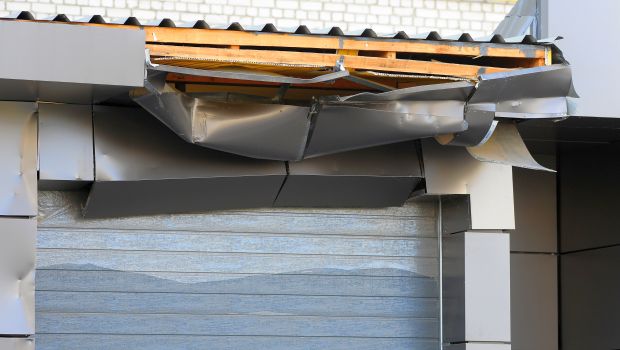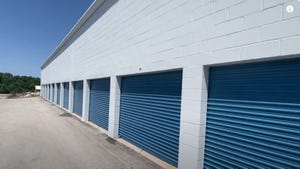Property damage can occur at a self-storage facility at any time, in a variety of ways; and it can cost the operator more than just money. Here are the industry’s five most common causes of damage claims and things you can do to limit risk and loss.

There are many ways for property damage to occur at a self-storage facility. Careless tenants, criminals, faulty equipment and natural disasters can wreak havoc and cause tens of thousands of dollars in destruction. But a loss of this nature costs the business more than just money. It consumes time and energy, and it can negatively impact your customers, community and public repuation.
Let’s address the five common causes of property damage in a self-storage environment and some ways to mitigate related risk and loss.
1. Weather
Recently, severe natural disasters have cost insurance companies billions of dollars in claims. From strong hurricanes to blazing wildfires to extreme freezing temperatures, the dramatic changes in weather patterns have pushed insurance companies to increase rates, limit coverage and, in some cases, completely pull out of an area. As a result, self-storage owners should expect an increase in property and casualty insurance rates for the next few years.
Examples of common weather-related incidents that can cause severe damage at a self-storage facility include:
Wind
Hail
Tornado
Hurricane
Lightning strike
Flood
Most exposures are covered under the wind-peril portion of your property-insurance policy. In areas more prone to wind and hail damage, however, underwriters may require a higher deductible and limit the coverage available. Insurance companies use forms like “cosmetic damage limitation” and “actual cash value roof restrictions” to control their exposure to costly replacements, such as roofs. This is why it’s essential to understand your policy terms, so you can plan for any potential gaps in coverage.
Building age and construction quality (especially on roofs) will impact how well your facility weathers a storm. Not coincidently, underwriters consider these important factors when reviewing an insurance application. Good preventive maintenance and annual inspections are risk-management techniques that help you know when upgrades are necessary.
2. Water
Water damage is a common cause of loss at self-storage facilities, and it isn’t always covered by your insurance company. When water rises through the building or foundation, it’s considered a flood and usually excluded. However, if a pipe bursts due to cold temperatures, it’s possible the damage will be covered.
Consider Winter Storm Uri, which hit Texas tremendously hard in February 2021, causing $20 billion in property damage. No matter where you are in the country, it’s important to prepare for low temperatures. In fact, you should have a freeze-protection system in place at your self-storage property to prevent temperatures from dropping below 40 degrees. This is a special consideration for facilties that were converted from other building types.
3. Fire
When it comes to fire, there’s a lot to consider. Climate change has led to devastating wildfires in several regions, and there are excalating threats from other natural disasters.
For example, lightning strikes are common. Does your access-control equipment have built-in lightning protection? If so, it could help prevent a severe power surge, which can cause substantial damage to electrical systems like gates, cameras and computers.
But let’s not forget the impact of tenant behavior. Though the storage of flammable substances is prohibited in most self-storage lease agreements, accidents still occur. For example, a tenant might be using a generator or trying to fix a vehicle in his unit. Maybe they’re attempting to grow marijuana, now that it’s decriminalized in many areas of the country. If you’re providing access to electricity within your storage units, you may be unwittingly increasing the potential for fire.
To deter risky behavior, install security cameras and post signs prohibiting these types of activities. Keep a watchful eye on tenants who are regularly inside their units for reasons other than loading and unloading. Prevention is crucial, particularly when you consider that self-storage fires are rarely confined to the source unit, and even a minor blaze can cause significant damage.
4. Vehicles
Another common cause of property damage is vehicle/building collision. This is a frequent occurrence in self-storage because, in many instances, the driver trying to maneuver a large moving truck around a tight corner is inexperienced. Though many facility operators believe it’s easy to subrogate against the personal insurance policy of the driver, it can be challenging to claim against the other party when the vehicle is a rental truck or the driver has minimum state limits.
A good way to minimize the fallout? Investing in brightly colored bollards, crash posts and prominently displayed signage, all of which can protect buildings from wayward vehicles.
5. Crime
Burglaries are unfortunate and the property damage can be significant. Depending on how a thief attempts to gain access to your self-storage units, replacement needs can range from locks to entire doors to walls and ceilings. With the cost of materials at an all-time high, the hit can add up to tens of thousands of dollars.
Fortunately, technological advancements have yielded many good security options for the self-storage industry. Controlled access, security cameras, lighting and smart monitoring are great ways to protect your facility and tenants’ belongings. Keep in mind, too, that in addition to being theft deterrents, some systems can detect water leaks, pests and changing humidity levels. Investing in security solutions can significantly lower your exposure to many types of losses!
Insurance Claims
When an incident occurs at your self-storage facility and you need to file a claim, it’s important to do so immediately. You need to file so an adjuster can be assigned to your case. They’ll gather details, so the insurance company can be prepared to act quickly if the claim escalates or the amount of damage is significant. In most cases, providing a “notice of claim” won’t negatively impact your loss history if the carrier doesn’t ultimately pay out.
Every self-storage employee should have access to and know how to fill out an incident report. It’s crucial to capture the details immediately, when it’s fresh in their mind. Staff should also document any damage with photos and video.
Keep in mind, too, that the owner has a responsibility to protect their property from further harm. If you must hire a disaster-restoration company, do so; just be sure to document the records and receipts to provide to your insurance company.
Legal Protection
When damage strikes at your self-storage units and customers’ goods, your signed rental agreement is your first line of defense. Your insurance adjuster will expect a copy of a signed lease for each tenant affected, so make sure all contracts are reviewed and updated regularly to comply with state regulations. They should contain a value limitation, which is imperative in limiting your exposure to a lawsuit. You don’t want to learn after you file a claim that a lease isn’t signed or is missing the proper language.
Offering customers tenant insurance or a property-protection plan is another key way to limit your exposure to damage-related lawsuits. Some operators even require it now as a condition of rental.
Peace of Mind
As a real estate business, self-storage can be exposed to many types of property-damage claims, but you can limit your risk by staying on top of preventive maintenance, security measures and legal concerns. Work with an insurance agent who specializes in the industry, understands its exposures and can help you protect your asset through the appropriate coverages. A good agent should also be able to discuss ways to negotiate more favorable policy terms that will give you peace of mind at a reasonable cost.
Jessica Lamoureux is the program manager for the self-storage division of World Insurance Associates LLC, which offers insurance and risk-management solutions to self-storage owners nationwide. The company services more than 200,000 clients from more than 135 offices. For more information, call 860.955.9944; email [email protected].
About the Author(s)
You May Also Like





